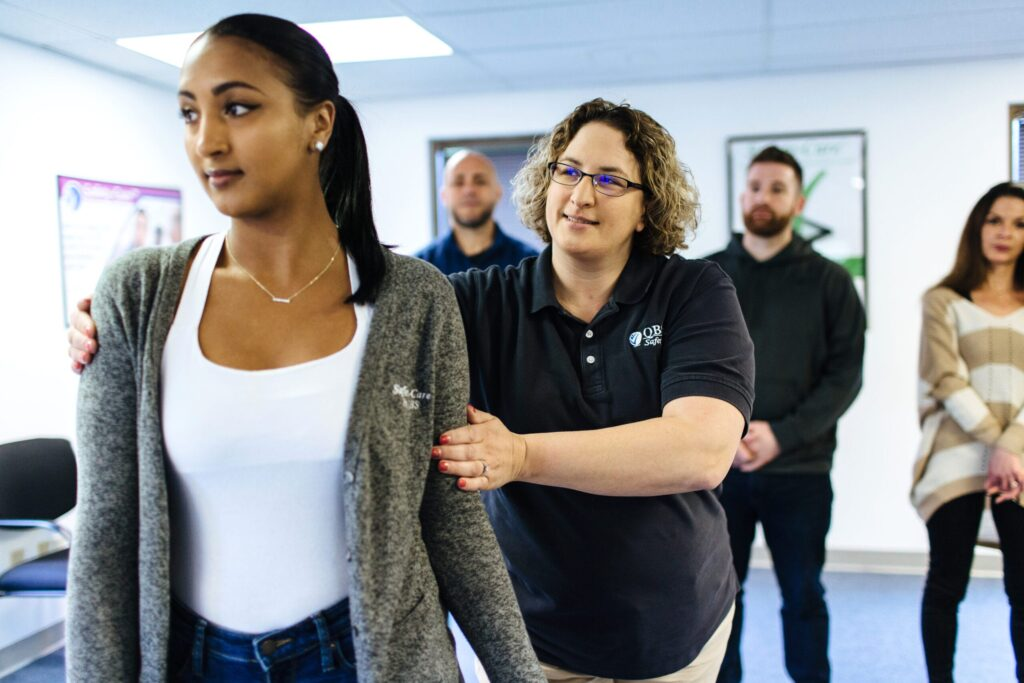Nebraska Legislative Bill 705 – Behavioral Intervention Training and Teacher Support Act
During the 2026-27 School Year, districts must begin providing behavioral awareness training to all professional and support staff. These trainings must include instruction on verbal and non-verbal de-escalation techniques, trauma-informed care, positive behavior support, and proactive teaching strategies. Additionally, those who undergo the training must participate in regular continuing education courses to remain up to date with current practices.
.jpg)
.png?width=88&height=95&name=Group%20137%20(5).png)


How to Implement Safety-Care?
1. Register for a Safety-Care Trainer class or call us to request a closed session for your organization. We regularly conduct classes in all 50 states and Canada.
2. Complete your class to become a certified Safety-Care Trainer for your organization. We bring you to fluency using an errorless teaching methodology.
3. You train and certify your staff in Safety-Care’s effective techniques.
4. Our Master Trainers are available by phone, email, or video to help your organization with any questions or concerns while using or implementing Safety-Care.

Legal Requirements
|
Summary: Passed: 6/1/23 Last Updated: December, 2024 During the 2026-27 School Year, districts must begin providing behavioral awareness training to all professional and support staff. These trainings must include instruction on verbal and non-verbal de-escalation techniques, trauma-informed care, positive behavior support, and proactive teaching strategies. Additionally, those who undergo the training must participate in regular continuing education courses to remain up to date with current practices. How Safety-Care aligns: Numerous school districts throughout the United States and Canada rely upon QBS and our Safety-Care training to provide their staff members with the training they need to help maintain a safe and healthy learning environment. Safety-Care provides a comprehensive, supportive approach to incident prevention, de-escalation, and management. District staff will learn practical strategies for helping students that use evidence-based practices consistent with PBIS (Positive Behavior Interventions and Supports) and ABA (Applied Behavior Analysis). |
|
Nebraska Revised Statutes Ch. 79-3602 Sec. 3 §(1)(b) Beginning in SY 2026-27, each school district shall ensure that each administrator, teacher, paraprofessional, school nurse, and counselor receives behavioral awareness training. The length of such training shall be a reasonable amount as determined by each school board. How Safety-Care aligns: Safety-Care uses a Train the Trainer model allowing each district to quickly develop their own core of trainers qualified in the most current behavioral interventions and de-escalation strategies. Our Master Trainers can have up to ten (10) staff ready to train in as little as three days. |
§ (1)(c) Behavioral awareness training shall include, but not be limited to, evidence-based training on a continuum that includes:
|
Why Safety-Care?
Benefits & Differentiators
In addition to Safety-Care being highly cost-effective, you get:

Skills to effectively prevent, minimize, & manage behavioral challenges with dignity, safety, & the possibility of change

Decreases in staff and patient injuries and reduction in restraint & seclusion time

Instructional procedures based on decades of evidence-based research & compatible with ABA, PBIS & reinforcement-based environments

Customizable program for your setting, staff & clientele, with a strong focus on preventative via non-intrusive, replacement behaviors

Extremely rigorous standards grounded in errorless teaching methodology

Small, intimate class sizes backed by unlimited support & resources
How Is Safety-Care So Effective?
A Genuine Focus on Implementing & Managing Positive Behavioral Skills
Proactive, environmental management recommendations
Understanding of evocative effects of staff behavior
In-depth analysis of antecedents and proactive antecedent interventions
Evidence-based reinforcement procedures
Required competency in de-escalation skills
Humane, non-invasive touch and QBS Check™ strategies
Evidence-based teaching procedures
Applicable to a wide array of settings, conditions & challenging behavior





